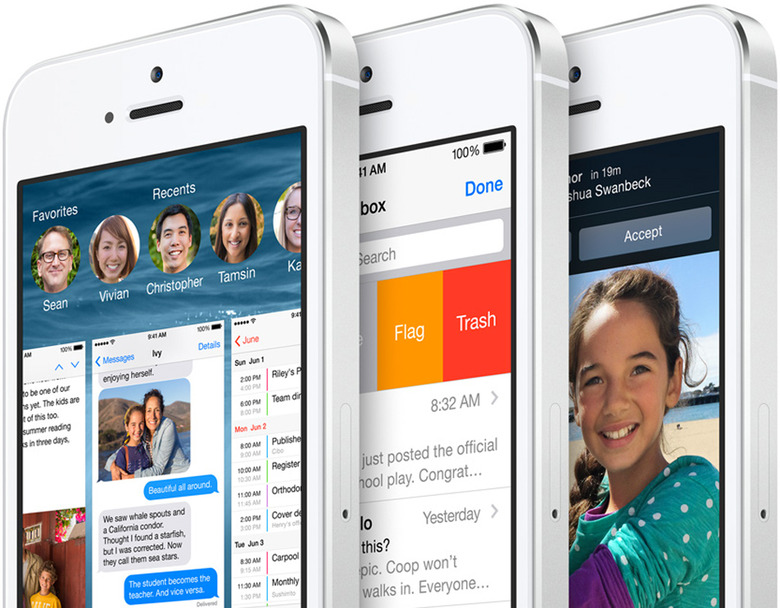The 5 Best New Features Coming To Your iPhone Tomorrow In iOS 8
For enthusiastic iPhone and iPad users, the wait for Apple to release iOS 8 to the public seems like an eternity. The company first unveiled its next-generation mobile platform this past June at its annual developer conference and since then, there have been constant reminders of iOS 8's awesome new features each time a new beta was released. As of tomorrow when Apple finally releases iOS 8 to the public, however, iPhone and iPad users will have access to all of the great new features Apple has introduced in its latest OS build.
Which new features should you be most excited about? We've put together a list of the five best features coming to your iPhone and iPad tomorrow when iOS 8 is finally released.
DON'T MISS: iOS 8 preview: A week with iOS 8
Widgets
The tiny box in which third-party apps are confined isn't so tiny anymore in iOS 8.
Apple has historically kept a very tight leash on developers, limiting access to key iOS features in order to ensure adequate battery life and to keep devices secure. In iOS 8, Apple has finally found ways to let developers spread their wings a bit, and one way they can do that is with widgets.
As we showed you in a recent hands-on preview of the new iOS 8 Dataman widget, the sky is the limit with iOS 8 widgets, which can bring a wide range of new functionality to iOS devices. The bad news, however, is that widgets are confined to the Today screen in Notification Center, thus ensuring battery drain and clutter are kept to an absolute minimum.
Extensions
Widget support in iOS is part of a broader category of improvements in iOS 8 that will really change the way we use our phones and tablets.
In iOS 8, Apple has added support for several different types of extensions, which we outlined in an earlier post here on BGR:
- Today extensions, or widgets that sit in the notification center. These will be able to show limited information, such as sports scores, and basic functionality, such as raising an eBay bid.
- Share extensions give will let you share information from one app, such as links or photos, to an online service. This was previously available, but only for online services specifically chosen by Apple, such as Twitter or Facebook. Now it will be open to any online service, such as Tumblr or Pinterest.
- Photo Editing extensions let you edit photos in the main Photos app without exiting the app. You'll be able to use photo editing features from apps such as VSCO Cam to edit the photos in your main camera roll. When you edit a photo, the Photos app will keep both the original and the edited versions.
- Storage Provider extensions let apps with a document picker select documents from multiple services, such as Dropbox, iCloud, or Microsoft's OneDrive.
- Custom keyboard extensions let you switch from the default keyboard. Instead, you can use third-party keyboards, such as the popular Fleksy or Swype keyboards.
- Action extensions are the most interesting of the Extensions and have the most potential to change how we use iOS. They allow apps to "manipulate or view content" in another app. For example, in Safari you could tap a Bing Translate extension that would translate the current website.
Interactive Notifications
Apple's mobile devices became infinitely more useful when Apple did away with its horrible old notification system and "borrowed" Android's system to create the Notification Center. In iOS 8, Apple has "borrowed" even more ideas to refine its notification system and create interactive notifications.
Interactive notifications are like little temporary widgets. For example, when a new iMessage or text message notification appears at the top of the display, users can swipe downward to open a small reply window at the top of the screen.
QuickType Keyboard
Apple's new iOS 8 software finally supports third-party keyboards thanks to the extension support mentioned above, but Apple's own keyboard is already dramatically improved in iOS 8.
Apple's new QuickType keyboard finally brings in-built word prediction to iOS, which will definitely help offset Apple's terrible auto-correct feature — though, to be fair, auto-correct seems to work a bit better in iOS 8 than it has in earlier iOS versions.
Continuity
iPhone and iPad users who also use Mac computers will see a whole new world open up to them thanks to iOS 8.
Once OS X Yosemite is released to the public, it will unlock a new set of features in iOS 8 that Apple calls Continuity. With these great new features, iOS mobile devices and Mac computers will feature tighter integration out of the box than any other devices on the market.
Want to answer phone calls on your laptop? No problem. Wish you could reply to text messages on your Mac Pro? Done. Did you just get to your office and you want to keep editing that document on your iPad? A simple swipe and it's now open on your Mac.
Continuity features are a fantastic addition to the iPhone and iPad, and once they become available following Yosemite's release, we'll wonder how we ever survived without them.
